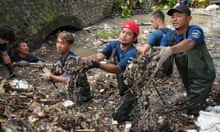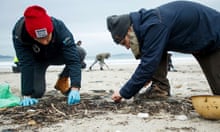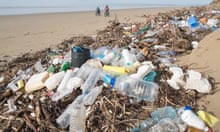As UN talks begin to agree the first global treaty to reduce soaring plastic waste, the chair of the meetings has said he is confident countries will come together to secure an agreement.
Luis Vayas Valdivieso, the Ecuadorian ambassador to the UK, admitted it would be a challenge to overcome an impasse that has emerged between countries which produce plastic and others that have ambitions to tackle plastic pollution over its whole life. But Valdivieso, who will chair the UN intergovernmental negotiations on a future international legally binding instrument on plastic pollution in Ottawa, Canada, this week, said: “We have to face those challenges and work with them. Compromise is an important word that we need to take into account.
“This is a negotiation, there are regions and countries with a specific position that we understand. We know plastic pollution is affecting the environment, we know it’s affecting human health because of the substances in plastics.
“It is very important we are negotiating this treaty now. The world is in a triple crisis of climate change, biodiversity loss and pollution. But while there are agreements in place for the first two, we have no legislation, no global agreement on plastic pollution.”
Plastic pollution is a critical global concern, with about 400m tonnes produced every year, much of which ends up in our oceans or in landfill. Beyond the crisis of pollution, there is also a growing body of science exploring the rapid way that microplastics are affecting human health; a recent US study looked at 62 human placentas and found microplastics in every single one.
In a historic agreement in March 2022 countries adopted a mandate opening negotiations for a global, legally binding treaty to address the whole life cycle of plastics.
Previous negotiations in Nairobi stalled last November when oil-producing nations proposed to focus on waste management rather than scaling down production of plastic. Most – 98% – of single-use plastics are made from fossil fuels, and the top seven plastic-producing companies are fossil fuel companies, according to data from 2021.

Graham Forbes, the global plastic projects leader at Greenpeace USA, said: “You cannot solve the pollution crisis unless you constrain, reduce and restrict plastic production.”’
Valdivieso, however, said he had not stopped working since the Nairobi talks in his attempt to forge a pathway to the first legally binding agreement on plastic waste. “It is crucial now to bring the treaty back on track, because it has been delayed now,” he told the Guardian.
“We are going to face some challenges and we will face more, because we are talking about plastics that are a big part of the world’s economy. So there are challenges when you need to regulate pollution from those products.
“Our mandate is the whole life cycle of plastic. The challenge is to define that.
“But what is clear is we cannot manage the amount of plastic we are producing. Only 10% of it gets recycled, something needs to be done and that is why these negotiations are so important. We need to have the whole life cycle approach.”
after newsletter promotion
Valdivieso said he was confident the talks would lead to the signing next year of the first legally binding treaty on plastic pollution, in a Paris-style agreement. The talks this week in Ottawa will be followed by talks in Korea at the end of the year and he said the text would be ready for all countries to sign for the treaty declaration next year.
Ecuador is one of four countries bidding to host the diplomatic conference – where the treaty would be signed, and wants to hold the event in the Galápagos Islands, where the waters are designated a Unesco heritage site but are suffering from plastic pollution.
Part of the discussions this week in Ottawa will be to decide where the treaty will be signed.
Valdivieso said: “Everyone is suffering from the impact of plastic pollution. Not only developing nations, and island nations, but everyone. If we don’t do something we will leave this problem to future generations.
“I became a grandfather recently and we need this tool, this incredible tool to end plastic pollution. I am confident that we will do it.”










